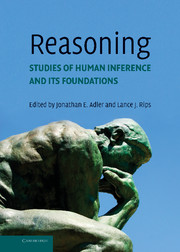Book contents
- Frontmatter
- Contents
- Preface
- List of Contributors
- Introduction: Philosophical Foundations
- PART I FOUNDATIONS OF REASONING
- Section 1 Some Philosophical Viewpoints
- 1 Change in View: Principles of Reasoning
- 2 Belief and the Will
- 3 Internal and External Reasons
- 4 Paradoxes
- Section 2 Fallacies and Rationality
- PART II MODES OF REASONING
- PART II INTERACTIONS OF REASONING IN HUMAN THOUGHT
- Index
- References
4 - Paradoxes
Published online by Cambridge University Press: 05 June 2012
- Frontmatter
- Contents
- Preface
- List of Contributors
- Introduction: Philosophical Foundations
- PART I FOUNDATIONS OF REASONING
- Section 1 Some Philosophical Viewpoints
- 1 Change in View: Principles of Reasoning
- 2 Belief and the Will
- 3 Internal and External Reasons
- 4 Paradoxes
- Section 2 Fallacies and Rationality
- PART II MODES OF REASONING
- PART II INTERACTIONS OF REASONING IN HUMAN THOUGHT
- Index
- References
Summary
ACTING RATIONALLY
Newcomb's Paradox
You are confronted with a choice. There are two boxes before you, A and B. You may either open both boxes, or else just open B. You may keep what is inside any box you open, but you may not keep what is inside any box you do not open. The background is this.
A very powerful being, who has been invariably accurate in his predictions about your behavior in the past, has already acted in the following way:
He has put $1,000 in box A.
If he has predicted that you will open just box B, he has in addition put $1,000,000 in box B.
If he has predicted that you will open both boxes, he has put nothing in box B.
The paradox consists in the fact that there appears to be a decisive argument for the view that the most rational thing to do is to open both boxes; and also a decisive argument for the view that the most rational thing to do is to open just box B. The arguments commend incompatible courses of action: If you take both boxes, you cannot also take just box B. Putting the arguments together entails the overall conclusion that taking both boxes is the most rational thing and also not the most rational thing. This is unacceptable, yet the arguments from which it derives are apparently acceptable.
- Type
- Chapter
- Information
- ReasoningStudies of Human Inference and its Foundations, pp. 67 - 93Publisher: Cambridge University PressPrint publication year: 2008
References
- 1
- Cited by



